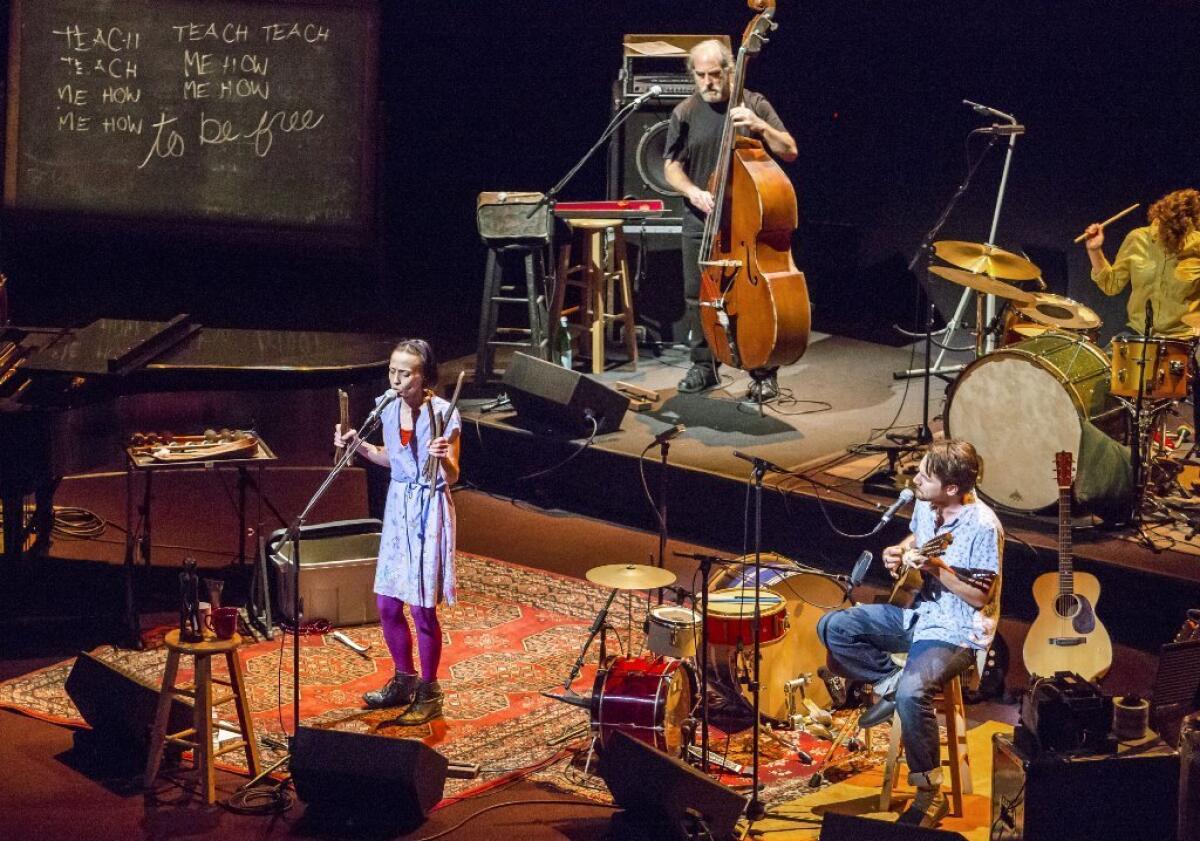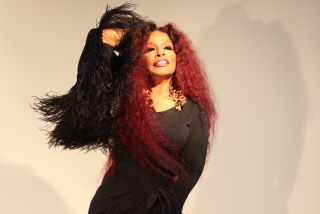Review: Fiona Apple, Blake Mills and band shine at Disney Hall

Abuzz with energy and surrounded by a few thousand fawning fans at Walt Disney Concert Hall, Fiona Apple made an admission. She and collaborator Blake Mills had been joking about the weight of their show all day, and “Now that we’re here, I feel like taking the most chances,” she said to her audience Monday night with a tone of nervous awe.
Stressing “the most chances,” the crowd erupted.
Apple’s reflex shouldn’t be surprising to anyone who’s followed her career. She’s a singer and pianist whose raw-wire onstage demeanor and honest, confessional lyrics combine to create a mystique that we crave in our artists, and her performance Monday with Mills, drummer Barbara Gruska and bassist Sebastian Steinberg at times felt like an expertly executed high-wire act, one with mid-rope instrumental handstands, melodic pirouettes and much percussive juggling.
“I think they’re afraid I’m going to fall down crying,” Apple said at another point, just after Mills had sung his “It’ll All Work Out.” She wasn’t wrong.
Billed as “Anything We Want: Fiona Apple & Blake Mills,” Monday’s set featured four musicians, 16 songs, one chalkboard (on which she wrote, “Teach me how to be free”) and a crowded, respectful hall.
The show was heavy on songs from Apple’s most recent album, “The Idler Wheel ...,” and the unit exuded the vibe of a jazz quartet letting loose with some standards, except they were reinterpreting their own work. Gruska’s amazing, miraculous fills, Steinberg’s Mingus-esque plucked-and-bowed double bass runs, Mills’ sharpened solos dotted with gentle, crystalline footnotes and asides, and Apple’s unflappable throat and nuanced piano melodies, all locked in the moment.
On a dramatic, memorable night, the quartet’s music at its best hit that sweet spot where acoustic rhythm and melody intersect, creating the accent of something primally American. During Apple’s “Every Single Night,” they were loose but sharp, steeped in the music of jazz and blues clubs and back-alley piano bars. Pulling the microphone from its stand, Apple held her torso tight with one arm as if she’d been shot, singing of ideas that “percolate the mind, trickle down the spine, swarm the belly, swelling to a blaze.” As she did so, Mills added thick, distorted chords that pierced the room.
PHOTOS: Unexpected musical collaborations
On Mills’ melancholy “Curable Disease,” he sang of tortured love while gently touching his guitar strings: “Love may be a curable disease/Your dreams, they are like pills.” The guitarist, an L.A. session man and producer who has worked with, among many others, Dawes, Band of Horses, Lana Del Rey, the Belle Brigade (Gruska’s guitar pop band), Lucinda Williams and Haim, shone as brightly as Apple, no small feat.
He performed a new song, “Seven,” with the refrain, “the seventh song on the record always makes me cry” as Apple tapped out percussion. His solo during the song was profoundly beautiful: So silent was the hall, the crowd attuned to every slight movement of his fingertips, that although he barely touched his strings to whisper out a curlicue melody, they rang like chimes.
Truth be told, though, the most memorable moments weren’t when the focus was on either Mills or Apple. Yes, it was impossible to not target the striking Apple, Olive Oyl-thin in lavender dress and purple tights.
There she was draped over a rotund marching band bass drum, gently hitting the head with a mallet. She crouched during Mills’ solo within the country standard “It’s Only Make Believe,” curled like a comma. Holding a wooden plank behind her back, she banged it softly on her spine as the band played. She quivered during “Anything We Want” while singing the line, “I looked like a neon zebra shaking rain off her stripes.”
Despite her charisma, though, it was when personality vanished beneath the shadow of musicians aloft that the evening hit its peaks. “Dull Tool,” a percussion-heavy track from the soundtrack to “This Is 40,” featured a revelatory bout of rhythm from Steinberg and Gruska. “Left Alone” began with a chaotic Gruska drum intro, followed by an Apple piano run, thick bass line and Mills delivering subtle accents.
I could have watched them play together all night long, and I wasn’t the only one. At times, the silence in the hall consumed as much space as the music. Absent the clanking glasses, smartphone ridiculousness and general human rumble of a club date, songs blossomed through some mystical sense of shared purpose. They played, we listened and, combined, we all wondered on the miracle of organized sound.
ALSO:
Album review: Fiona Apple’s ‘The Idler Wheel ...’
Album review: Haim’s ‘Days Are Gone’ earns good marks
Fab Faux don’t look like the Beatles, but they do sound like them
Twitter: @liledit
More to Read
The biggest entertainment stories
Get our big stories about Hollywood, film, television, music, arts, culture and more right in your inbox as soon as they publish.
You may occasionally receive promotional content from the Los Angeles Times.










